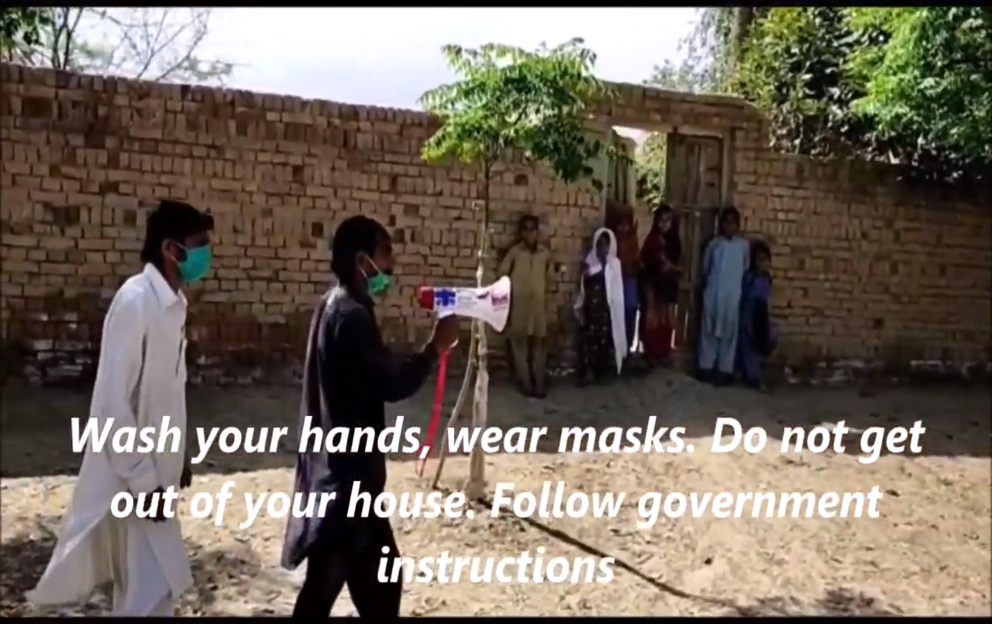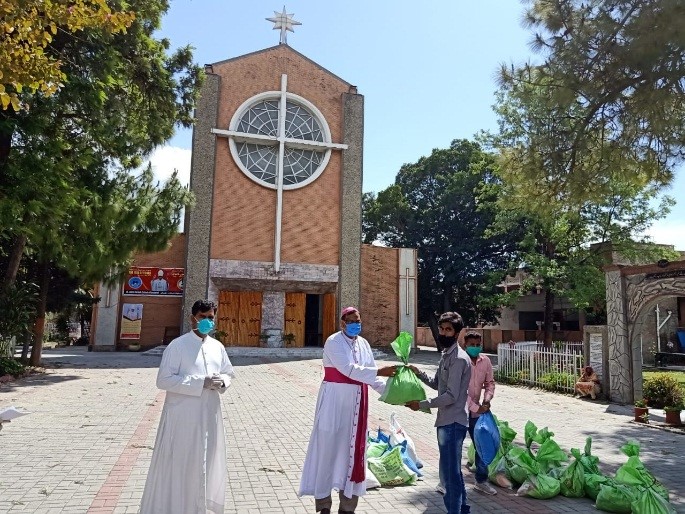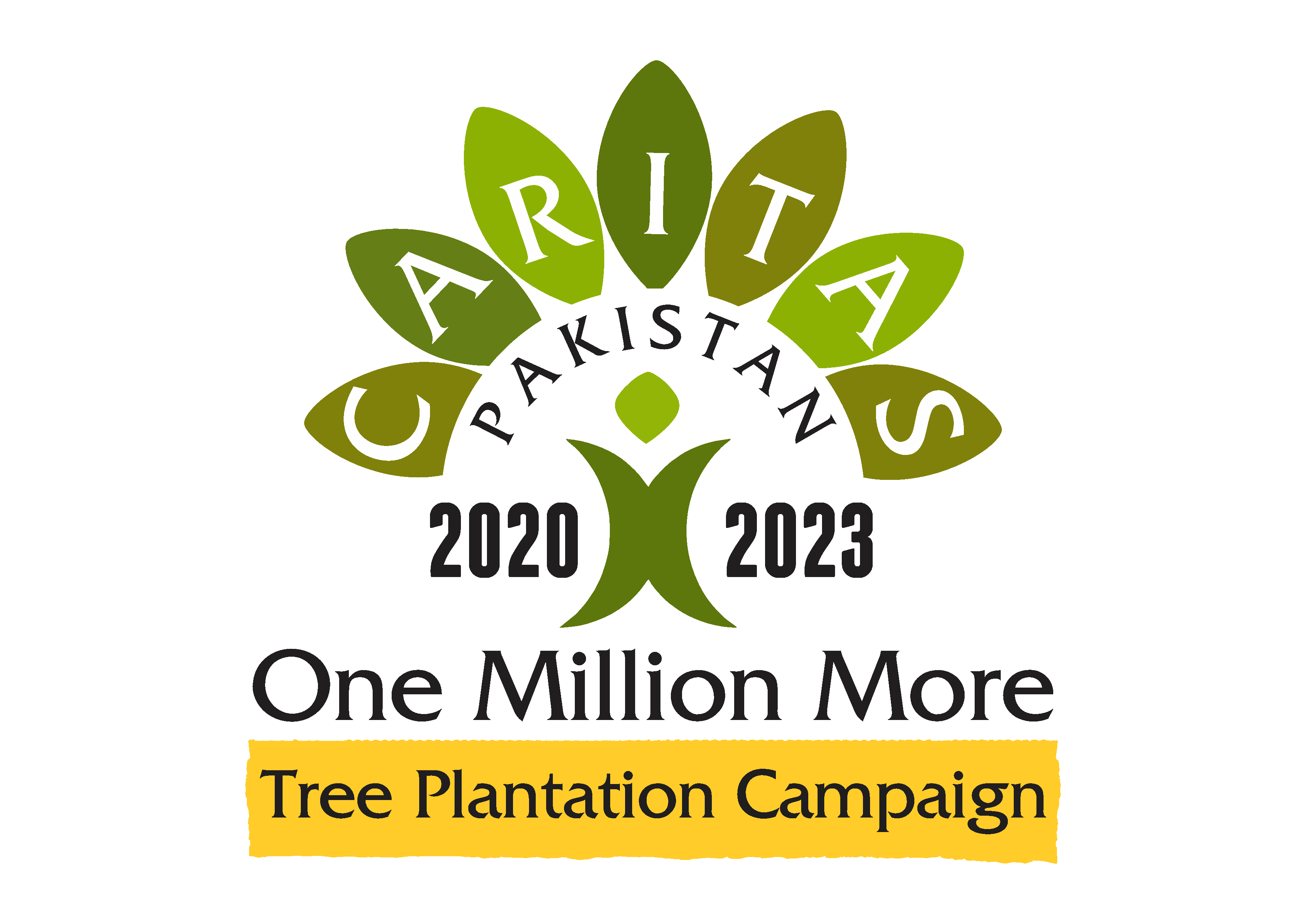No products in the cart.
COVID-19 in Pakistan
Covid-19 (Corona Virus disease 2019) is a disease caused by the virus named SARS-CoV-2 and was discovered in December 2019 in Wuhan, China. It is very contagious and has quickly spread around the world.
COVID-19 most often causes respiratory symptoms that can feel much like cold, a flu, or pneumonia. COVID-19 may attack more than lungs and respiratory system. Other parts of the body may also be affected by the disease.
- Most people with COVID-19 have mild symptoms, but some people become severely ill.
- Some people including those with minor or no symptoms may suffer from post-COVID conditions – or “long COVID”.
- Older adults and people who have certain underlying medical conditions are at increased risk of severe illness from COVID-19.
- Hundreds of thousands of people have died from COVID-19.
- Vaccines against COVID-19 are safe and effective. Vaccines teach our immune system to fight the virus that causes COVID-19.
Role of Caritas Pakistan in COVID -19
Caritas Pakistan being the social arm of Catholic church was active from the day COVID-19 alarmed the world. Caritas Pakistan was alert and diligent in playing its role by providing awareness and precautions about COVID-19 Response and situation.
All seven dioceses namely Karachi, Hyderabad, Quetta, Multan, Lahore, Rawalpindi and Faisalabad were actively working across the country. Caritas Pakistan focused on 55 districts through its strategic plan 2020-2023 for its different thematic interventions.
Following activities were conducted under Awareness Raising Campaign.
Development and dissemination of administrative guidelines for staff and volunteers
Administrative guidelines for the safety of its staff and volunteers during the current crises situation were developed. The guidelines consisted of the following precautionary measures
- Hygiene measures at workplace
- Precautionary measures for the visitors
- Capacity building of staff and volunteers
- Work from home mechanism –when applicable
- Sick leave mechanism
- Travel guidelines
- Mandatory actions for the staff and offices
- Guidelines for the ERT (Emergency Response Team)
- Advisory for the field staff
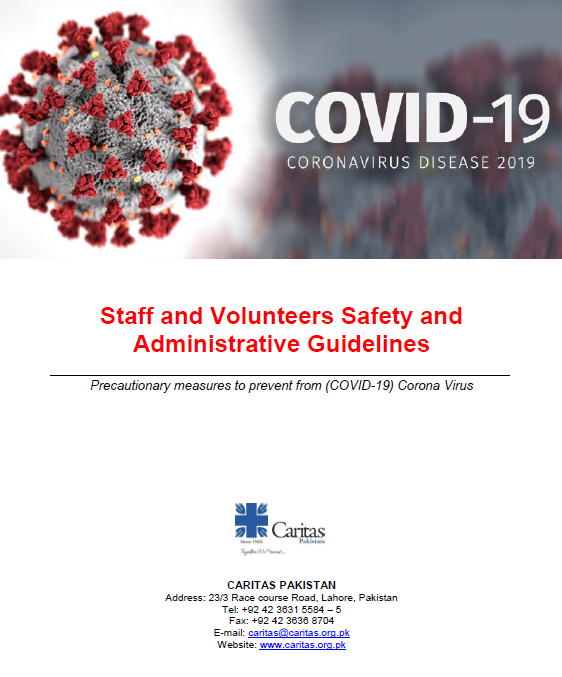
Awareness Raising through IEC Material
Caritas Pakistan developed different posters, pamphlets and banners under its awareness raising component for COVID-19 Response. The material was published by following the guidelines by (WHO World Health Organization).
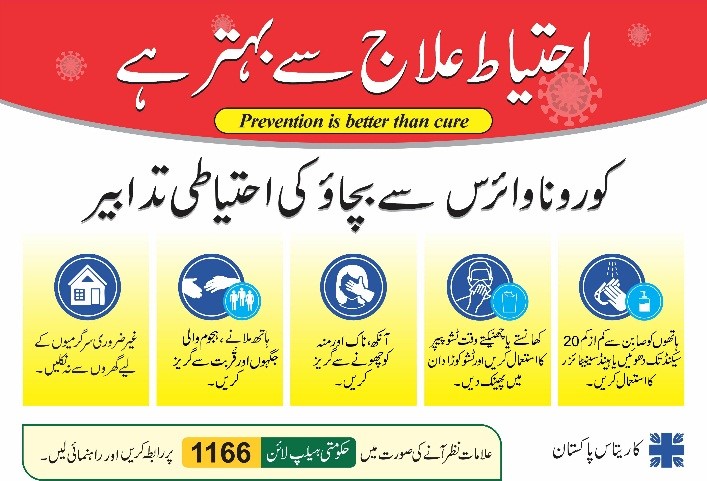
Awareness through banners
500 banners of size 8×6 were developed in national language which contained important information on symptoms and precautions about COVID-19. These banners were displayed at prominent locations so that this awareness should reach maximum number of people across the country. Priests, Clergy and community volunteers helped Caritas teams in the whole process of awareness.
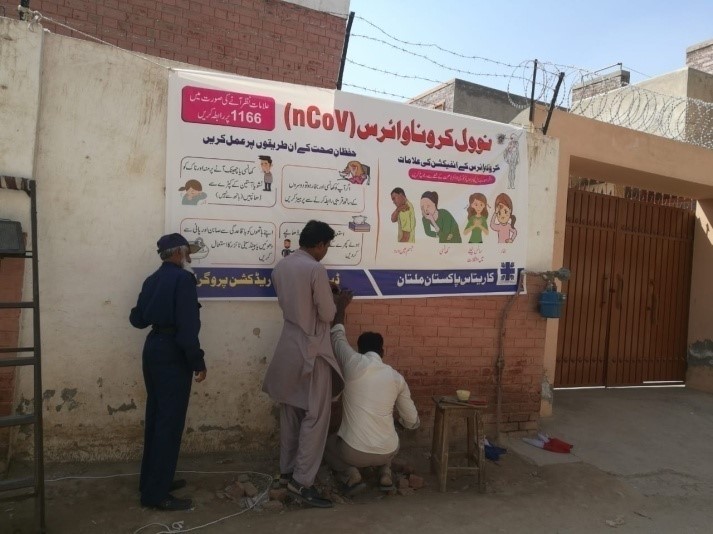
Awareness through Posters and Pamphlets
2000 banners and posters were developed and distributed for COVID-19 awareness raising. A government helpline number was also mentioned on the poster along with other important information. Pictorial pamphlet on the procedure on how to wash hands for twenty seconds. Staff and Community volunteers showed great gesture of dedication and motivation in distributing these posters and pamphlets door to door in their areas. They ensured all the safety and protective measures against COVID-19.
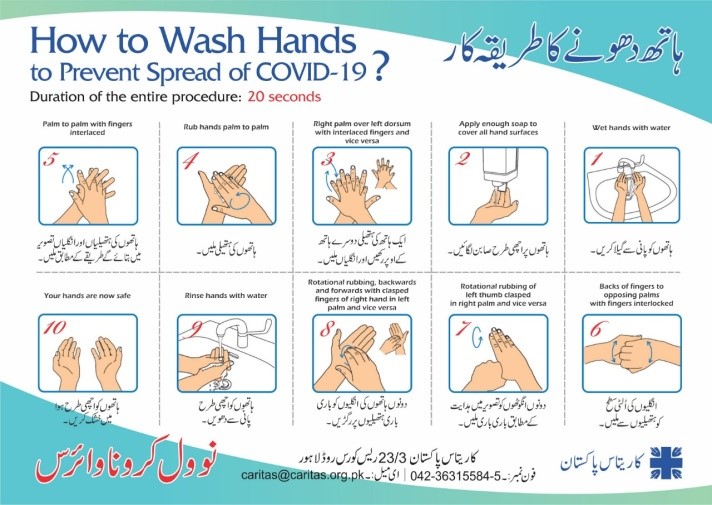
Awareness raising through Social Media
Caritas Pakistan raised awareness through social media as well. video messages were shared time to time on Facebook page to spread information as far and more as possible. IEC material was being shared through social media.
A public service message from Executive Director was also uploaded.
Caritas Pakistan used different platforms of social media to spread COVID-19 awareness. Awareness raising videos and messages were being shared by all the staff and volunteers.
Caritas Pakistan established a WhatsApp group “COVID-19 Information “for all the staff members to keep them updated. The information was being shared from all over the country. National Secretariat further disseminated the information to different stake holders after ensuring the authenticity of the information.
Caritas Pakistan uploaded at least two videos per week for the purpose of awareness and information sharing.
Challenges and Good Practices
There was a lock down all over the country. The best practice to prevent the disease was social distancing. Maximum staff was working from home and clear instructions for safety guidelines were shared with the staff and volunteers.
Social gatherings were completely avoided.
Field staff and volunteers were disseminating IEC materials by wearing masks, using hand sanitizers and ensuring social distancing.
Regular follow-up with the field teams was conducted.
Online meetings with program and core staff took place on regular basis.
Corona virus safety kits were distributed among staff and volunteers and community as well.
Caritas staff was regularly monitoring and sharing the situation and information to people in need for the provision of government relief and schemes.
Caritas Pakistan provided loud speakers, mega phones and safety kits to DMC’s to make any type of announcements regarding COVID-19.
Voice messages were prepared and broadcasted on local radios.
COVID -19 Precautions
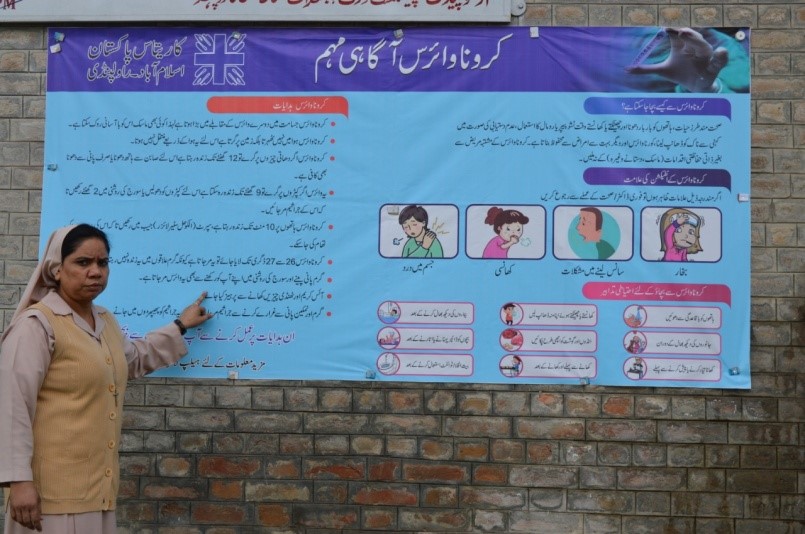
Immediate impacts
People were sensitized through these awareness campaigns. They got the awareness of precautionary measures and were dissemination the information among others as well.
Staff and volunteers were very proactive in providing training on three major components of prevention and response
- Use masks
- Maintain personal hygiene and
- Ensure social distancing.
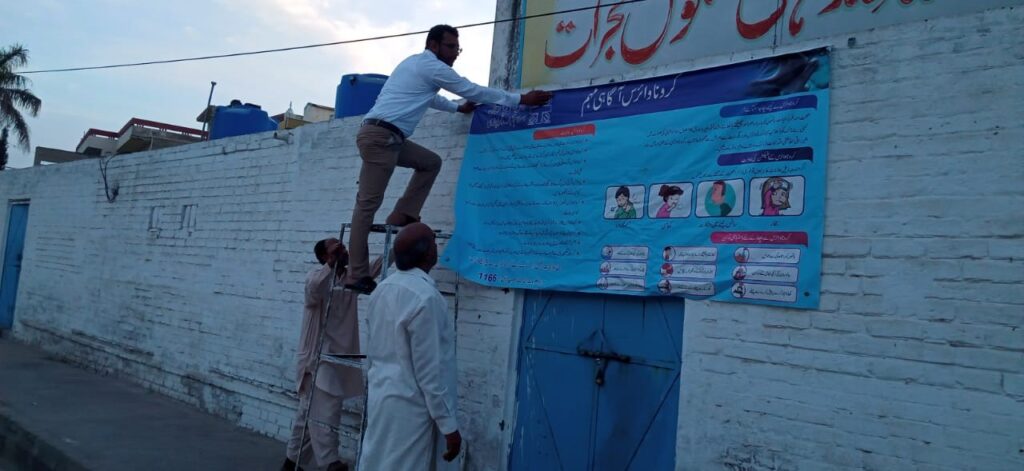
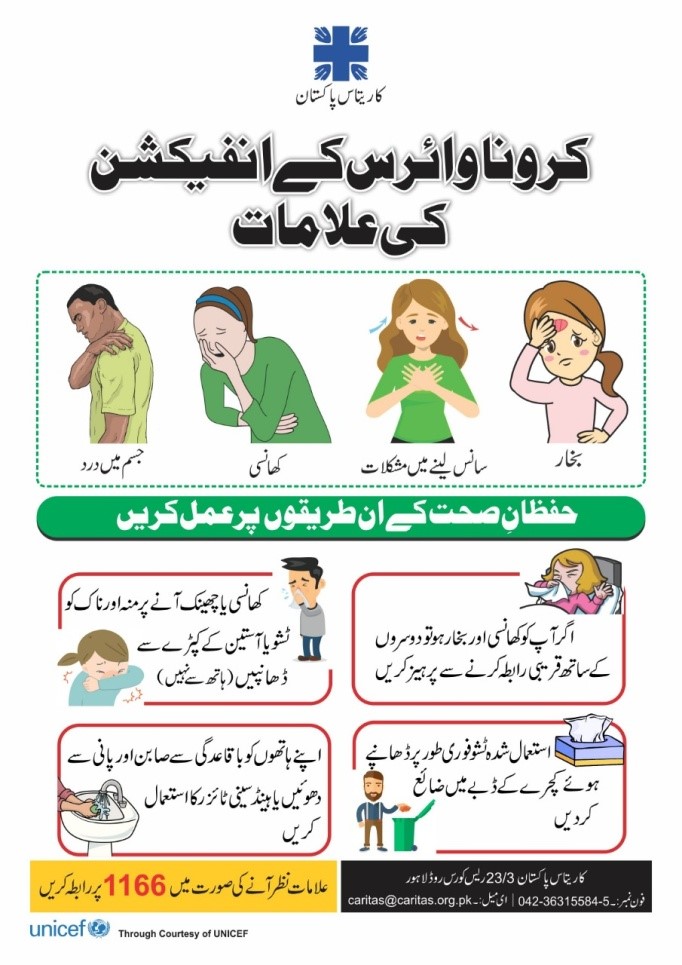
Pamphlets and IEC material
